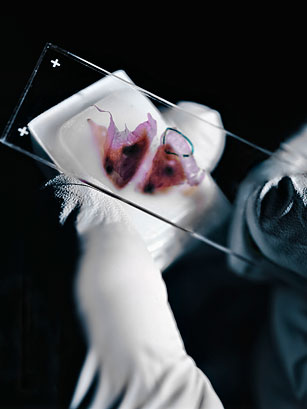
A scientist prepares to remove a small bit of tumor tissue — marked by the blue circle — from a biopsy sample for DNA sequencing
(3 of 3)
Any cost may well prove worthwhile, however, since even the first slivers of information from cancer genotyping are proving tantalizing. In the first large-scale sequencing of a cancer, using 38 tumors from patients with multiple myeloma, for example, Golub and his team found that this rare blood cancer shared with melanoma a genetic abnormality that causes cells to grow too fast. And that turned out to be a potentially lifesaving piece of information for multiple myeloma patients, since melanoma is already being treated with a drug that targets this aberrant gene.
That's just the first and easiest example of how clinicians and pharmaceutical companies will start exploiting their newfound genetic knowledge with trials of other existing drugs to treat new cancers. The multiple myeloma genome also highlighted several genes that no scientist had ever even described before in the literature, which could become targets for entirely new classes of drugs.
Ellis and his team have sketched out a similar map of one type of breast cancer — tumors that are positive for receptors of the hormone estrogen. Like Golub and researchers at TCGA, they are beginning to see patterns in the genetic triggers of cancer. They suspect, for example, that cancer is not a disease of blockbuster mutations, in which a majority of patients with a particular cancer share aberrations in one or even a few genes. Instead, it's likely that each type of cancer may have a few "driver" mutations and a host of "passenger" changes that appear at a very low frequency. The good news is that both suites of aberrations tend to funnel into a common molecular trunk, like the branches of a tree, and it's that trunk of processes that can become a powerful target for new treatments.
Eager to put genotyping into practice, doctors at MD Anderson and Massachusetts General Hospital, among others, have already begun using sequencing technology to guide treatment of patients in clinical trials. Even without the full genome map of certain cancers, clinicians are using known mutations linked to cancer to dictate which drugs patients receive. In MD Anderson's program, all lung-cancer patients are offered the chance to join a trial in which their tumors are genetically analyzed for some well-known genetic defects thought to play a role in cancer. About 15% of lung cancers, for example, show mutations in a gene that makes a protein critical for cell growth. Patients with this aberration can enroll in trials in which FDA-approved drugs targeting that mutation are being tested as a first-line therapy, instead of chemotherapy, for treating their disease, giving them a head start in gaining any benefits the drugs might provide. (At the moment, these drugs are approved only for patients with advanced cancer for whom other therapies have failed.)
Cancer experts aren't naive enough to believe that sequencing a tumor just once will reveal all they need to know. Cancer is constantly changing its offensive and defensive plans in response to whatever treatments doctors are using against it. The idea is to rebiopsy patients periodically and allow the dynamic genetic changes in the tumors to educate doctors about how aggressive the cancer is, whether it has developed resistance to drugs and even whether it has spread. "The concept is to let the tumor teach us how to treat patients," says Dr. Waun Ki Hong, head of cancer medicine at MD Anderson.
It's all part of the leap toward personalized cancer care, the therapeutic beacon toward which researchers and doctors have been navigating for a long time. "We fully expect that 10 years from now, each cancer patient is going to want to get a genomic analysis of their cancer and will expect customized therapy based on that information," says Brad Ozenberger, TCGA's program director. Only with more individualized therapies that match the right treatment with the right patient at the right time will the battle ultimately be won.